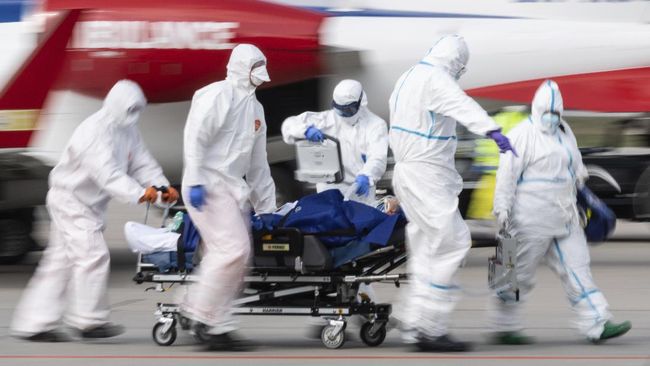Jakarta, CNBC Indonesia – Germany was seen as a beacon for other European countries during the coronavirus (Covid-19) wave and was hailed as one of the countries with the world’s best health care system.
But that was before the pandemic, now that Germany appears to be struggling with a coronavirus infection that is more severe than ever.
The number of coronavirus infections hit an all-time record last Friday (20/11), with nearly 24,000 new daily cases registered, as well as the number of patients in the country’s intensive care unit (ICU).
Official data from the German Interdisciplinary Association for Intensive and Emergency Medicine (DIVI) shows that the number of Covid-19 patients in ICU hospitals in Germany has increased from 267 on September 21 to 3,615 on November 20.
The number skyrocketed 13 times in just 2 months.
Worldometers data also shows, as of November 21, Germany was ranked 13th with a corona positive of 908,510 people with a daily increase of 6,851, with the death toll of 14,147 people.
The country with the largest economy in Europe is actually able to weather the pandemic quite well for now compared to its neighbors.
This is due to its high intensive care capacity with 33.9 beds per 100,000 population; in contrast, Italy only has 8.6.
But with Covid cases across the region skyrocketing, even Germany’s health care system is under pressure and hospitals in several regions of Germany are approaching their limits.
The record for the increase in positive Covid-19 patients has the potential to undermine Germany’s position as one of the countries with the best health system.
“The number of severe cases in intensive patients is still increasing. The number of deaths is something that is not really discussed and is still very high,” said Steffen Seibert, spokesman for Chancellor Angela Merkel, quoted by CNN, Sunday (22/11/2020).
“We haven’t managed to get the numbers back to low levels. We’ve basically only gotten past the first step so far, which is stopping a strong, steep and exponential rise in infections and we’re now stable, but our numbers [pasien positif Covid-19] still very, very high. “
Michael Oppert, Head of Intensive Care at Ernst von Bergmann hospital in Potsdam, just outside Berlin, is equally concerned about the dramatic increase in recent weeks, and fears things are getting worse.
“We are not at the peak of the pandemic right now, at least as far as I can see,” he told a visiting CNN team this week.
“And we do have the capacity for a few more patients, but if this continues at the pace we’re experiencing right now, I would imagine that even our hospital, with more than 1,000 beds, will get to the point where we have to send patients around. home or to another hospital for treatment. “
Bettina Schade, Chief Nurse on the Covid ward at the same hospital, described how the ward has changed over the past few weeks.
“The number of patients continues to increase. We are getting more patients with various degrees of disease. It is good for a normal Covid ward, but many also come to the emergency department and very quickly have to be admitted to the ICU,” he said.
“We currently have the necessity to get many patients from the normal Covid ward into the ICU very quickly because the patient’s condition is deteriorating very quickly.”
“This is true even for the many younger patients with severe symptoms, said Tillman Schumacher, a senior infectious disease doctor.
“We have patients aged 30 or 40 here who are on ventilators and I am not sure if they will survive.”
CNN noted that only two of the 16 ICU beds were empty and hospital staff had canceled non-urgent operations to provide capacity. In addition, the hospital team is also making plans to convert more public intensive care facilities into Covid units.
Dr. Uwe Janssens, Head of DIVI, explained what actions would be taken if the surge continues.
“The hospital’s regular program has to be closed, partial closure of regular operations and admissions of patients which you can postpone for a few weeks without any strain, they can be postponed,” he said.
“There are people who don’t need emergency surgery or emergency catheters or anything like that. They can be put off. And doing this you get the capacity and get nurses and doctors to help the ICU doctors and the ICU nurses on their wards. ”
After accounting for non-Covid patients, 22,066 intensive care beds in the country were occupied as of November 20, while 6,107 were still empty.
Germany has a reserve of around 12,000 ICU beds, including field hospital beds at the Berlin convention center.
Despite its large capacity, Health Minister Jens Spahn earlier this month warned that the ICU could be overwhelmed if daily infection rates continue to rise at current levels.
“We are now increasingly seeing an increasing burden and threat of being overwhelmed in intensive care, in hospitals and in general practitioners,” he said in an interview with ARD, Germany’s state-owned TV station.
(bag bag)
– .

;Composite=(type=URL,url=https://images.radio-canada.ca/v1/assets/elements/16x9/outdated-content-2016.png),gravity=SouthEast,placement=Over,location=(0,0),scale=1)